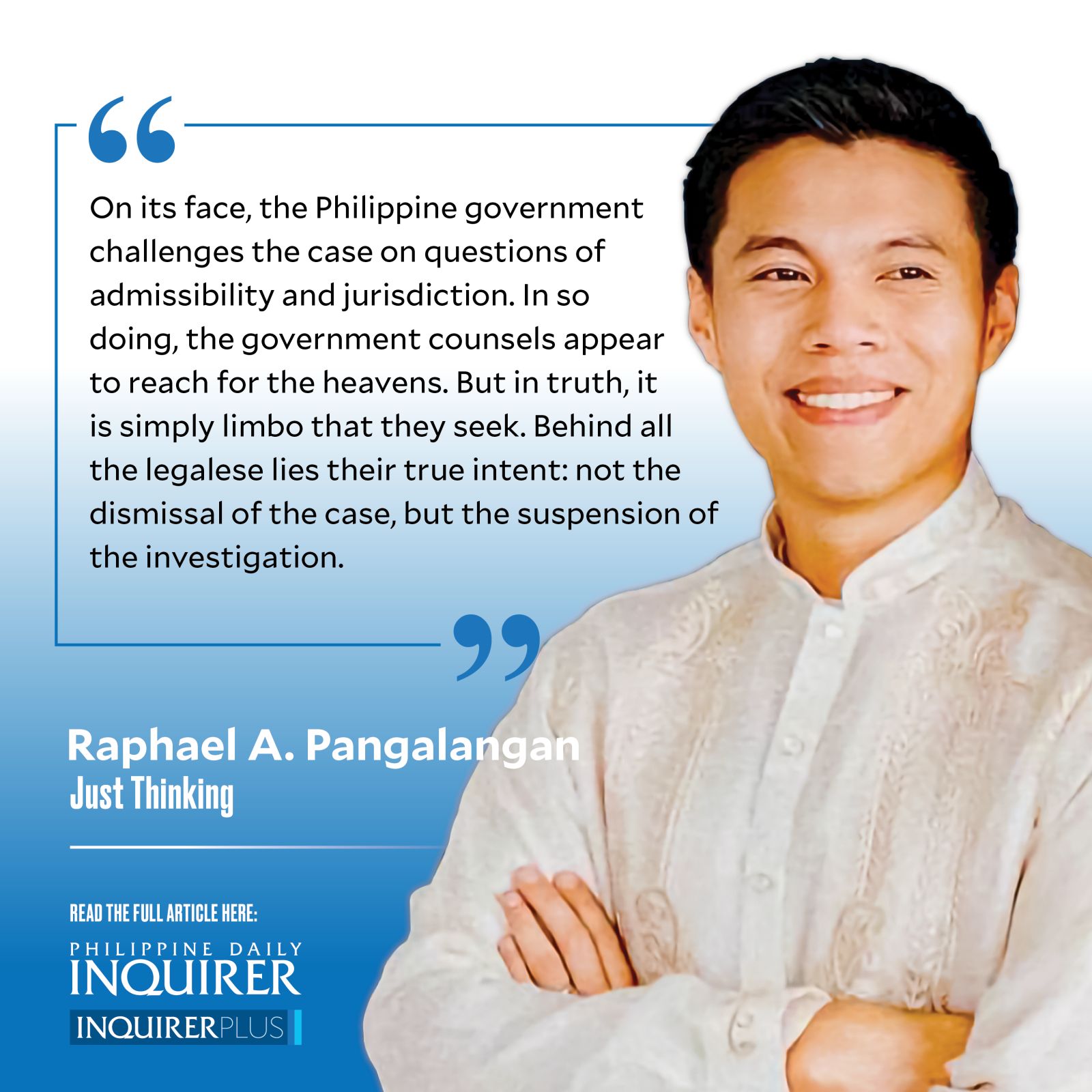ICC probe: Justice in limbo

A man of his word, Solicitor General Menardo Guevarra followed through on his promise to the International Criminal Court (ICC). Late last week, on Feb. 3, 2023, the Philippine government filed its appeal against the Pre-Trial Chamber’s (PTC) decision authorizing the Office of the Prosecutor (OTP) to resume its investigation in the Situation in the Philippines. Notably, the appeal against the order includes a rider: the application for “suspensive effect.”
The most tedious task of legal studies is engaging with the litany of law. Hours on end, students scour through hundreds upon hundreds of pages on the off chance that they will be called for a minute recitation on the likes of Javellana v. Executive Secretary (1973)—the Ratification Cases imprinted in minds across the nation not just for its doctrine but for its length.
Make no mistake, I’m no pretender. I myself have enjoyed my share of digest or two (for nonlegal readers: “digest” is law school parlance for “case summary”). Indeed, I was even contracted as a case writer by the Cambridge University Press to provide the official summaries of choice jurisprudence that have international elements. Yet for all my Okhamian pragmatism, even I have to admit that there is nothing quite like reading the originals. If not for the detail and nuance, for the security that comes with reading something official, or pseudo-official, in the case of Supreme Court Reports Annotated, CD Asia Online, or even Arellano’s Lawphil Project—as compared to, say, a digest off Scribd.com. If a digest fails to make sense, chances are the problem is with the digest reader/writer. On the other hand, if despite all efforts the original case itself fails to make sense, well, perhaps we could pin the blame on the case itself! Perhaps it’s not just bad judicial writing but, worse, bad judgment.
But in the case of the Philippine government’s most recent move, there’s no need for summaries just yet for what was filed was simply a notice of appeal which, as rightfully pointed out by the government counsel, must only state, without the need for further elaboration, the “name and number of the situation; the title and date of the decision being appealed; the specific provision of the Statute pursuant to which the appeal is filed; and the relief sought.” (Regulations of the Court No. 64(1))
Is that it? Certainly not. Rest assured, the appeals process before the ICC is no perfunctory measure. The meat of the argument will come in a separate pleading to be filed no later than Feb. 21, 2023. Regulation 64(2) goes on to provide that, within 21 days of notification of the decision, the appellant shall file a document in support of the appeal. In turn, this document “shall set out the grounds of appeal and shall contain the legal and/or factual reasons in support of each ground of appeal” in accordance with a proscribed list of formats and formalities.
So what’s next, you ask? Well, much like our domestic proceedings, the OTP would have 21 days to file its own response, should it decide to. But unlike our domestic proceedings, the appeal would not necessarily lead to the world of in-court jousting a la Suits. Rule 156 of the ICC’s Rules of Procedure and Evidence (RPE) states that “the appeal proceedings shall be in writing unless the Appeals Chamber decides to convene a hearing” and—perhaps even furthest from domestic practice— that “the appeal shall be heard as expeditiously as possible.”
On its face, the Philippine government challenges the case on questions of admissibility and jurisdiction. In so doing, the government counsels appear to reach for the heavens. But in truth, it is simply limbo that they seek. Behind all the legalese lies their true intent: not the dismissal of the case, but the suspension of the investigation.
Pursuant to Article 82(3) of the Rome Statute (Statute) vis-à-vis Rule 156(5) of the RPE, the suspension of the impugned decision is not automatic and may be made upon request. And lo and behold, the government’s Feb. 3, 2023 submission contains such a request.
As pronounced by the ICC itself, “neither the Statute nor the RPE stipulate in which circumstances suspensive effect should be ordered.” The “decision is left to the discretion of the Appeals Chamber,” subject to “specific circumstances of the case.” The threshold question is “whether the implementation of the Impugned Decision would create an irreversible situation“ of adverse consequence to the appellant (Prosecutor v. Lubanga Dyilo, ICC-01/04-01/06-1290, Appeals Chamber, April 22, 2008).
In the case at hand, the PTC had simply authorized the OTP to resume its investigation. At best, the PTC decision simply generated a situation where the OTP may proceed to investigate and hopefully receive Philippine cooperation. At worst, the situation is one where the OTP will conduct its investigation parallel to the alleged “ongoing” investigations by Philippines authorities. From my view, there is no “irreversible situation” here and, thus, no merit to the suspension of the PTC decision.
The onus lies with the appealing party. It lies with the Philippine government. Absent a showing of the adverse and irreversible, the appeal should be denied.
——————
thinkjustly@gmail.com




















